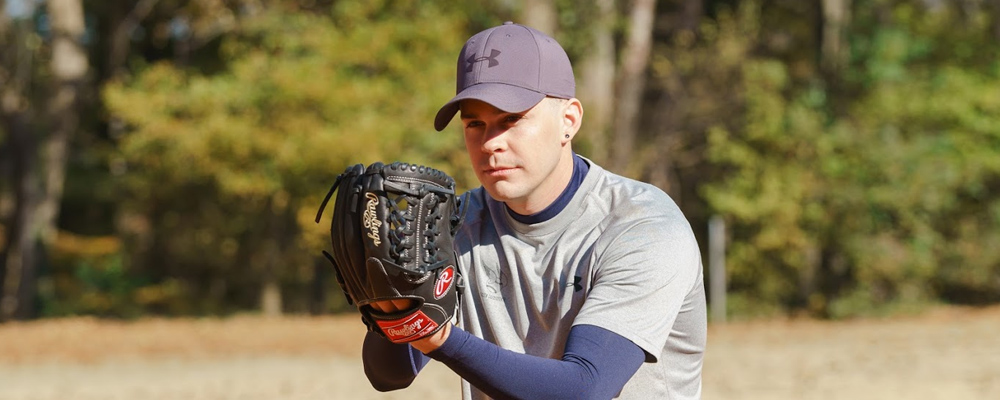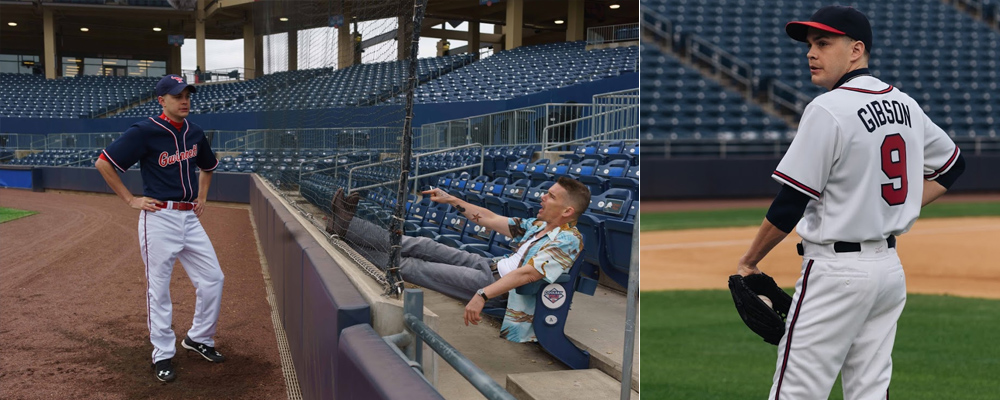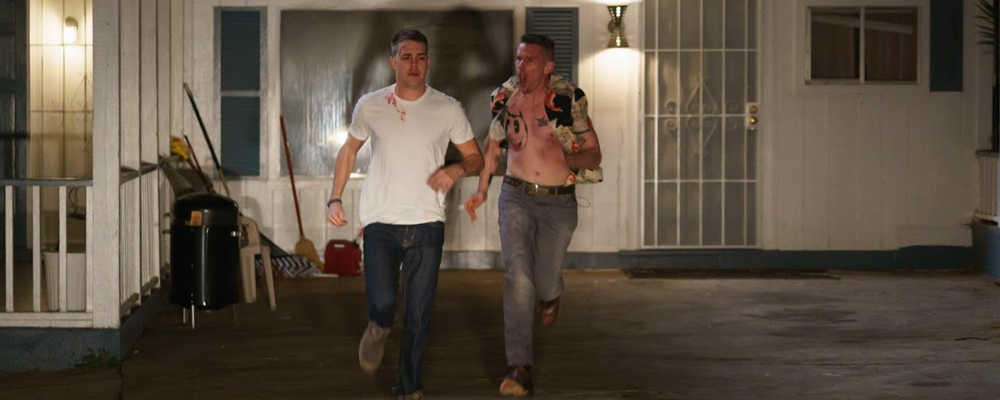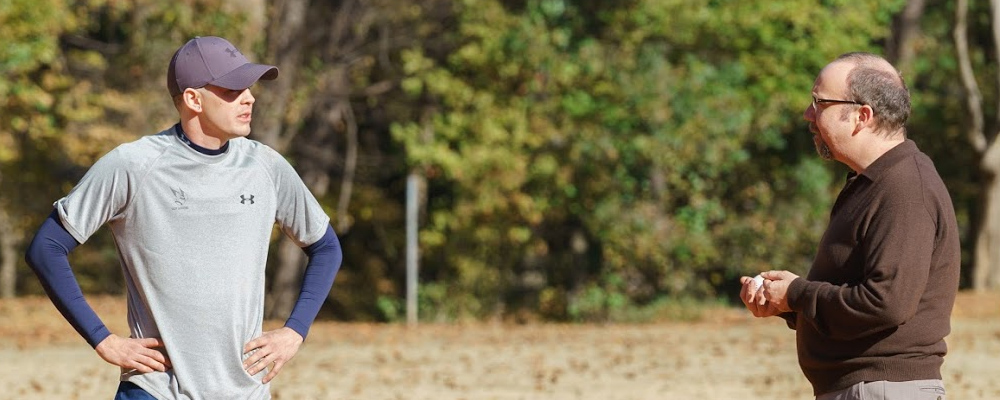Johnny Simmons Shares His Thoughts on ‘The Phenom’ and Confronting the Yips
Allyson Gronowitz
Johnny Simmons is not an athlete, but he plays one on the big screen. In Noah Buschel’s slow-burn sports drama, “The Phenom,” Simmons stars as Hopper Gibson, a Major League Baseball rookie whose psychological demons cause him to lose control of his pitching, landing him in the capable hands of a renowned sports psychologist (Paul Giamatti). As Hopper confronts the memories of his tyrannical and unhinged father (Ethan Hawke), he is also forced to come to terms with everything he believed about who he is and what he loves.
The 29-year-old Simmons is best known for his role as Young Neil in Edgar Wright’s “Scott Pilgrim vs. The World” and as closeted athlete Brad in “The Perks of Being a Wallflower.” But “The Phenom” might be the young actor’s most impressive performance yet as his thousand-yard stare and simmering sadness portray soul-crushing angst without the actor having to say a word. Off-screen, however, Simmons opens up to Entertainment Voice explaining in a melodious Texas accent how he confronts “the Yips,” where he imagines Hopper after the film and why Ethan Hawke’s terrifying performance brought out the best in him.
Did you play any sports growing up that helped you get into the mindset of the character of Hopper Gibson?
I played a few sports. Wrestling was my main sport in high school. And I did play baseball up until sixth or seventh grade. I wouldn’t call myself an “athlete” but in this movie, I learned that I did have the ability [to play]. Maybe once you get to [the level of NBA star] Steph Curry, [having] natural athleticism and muscle fibers and all that comes into play. But the biggest lesson was that it [takes] a lot of time, a lot of sweat and a lot of work. By the end of our shooting, I was able to throw a 75 mph fastball in the strike zone and have the right form and body mechanics to launch the ball exactly where I wanted it. That was fun to watch and fun to be able to do.
Your character in “The Phenom” deals with a major case of the Yips. Has this ever happened to you or anyone you know?
I think it happens all the time. Everybody I know gets very nervous. [But] I was talking to a girl last night who was about to go on stage and I said, “Do you get nervous?” She said, “No, once I get there, I’m fine. I’m nervous to get there on time but beyond that . . . .” So [I said], “What if you forget a line?” and she said, “I’ve never forgotten a line!” She said it with this cool, calm, collected voice. I am the complete opposite; I’m very neurotic and terrified even when I just have an audition. But I think there is something that does take over when you get in the room or get on the set in that when [the cameras are] rolling, the last thing you’re thinking about is if they’re rolling. You’re thinking everything the character is thinking. What’s great about a pitcher is that they throw, you know, hundreds of pitches. Acting, you go on a lot of auditions, but you don’t book as often as you audition so then you try to figure out what did I do that time that made me not get this role? And you get caught in your head where it’s really not about that, it’s just about going in there and bringing what you have to bring to the table and [hoping] it works out.
In the traditional sports narrative, the athlete struggles with a case of the Yips but then makes it through by sheer force of will. How does this film portray the struggle differently?
Yeah, Noah [Buschel] wanted everything to be very understated. [Hopper] is like a trap door where nothing goes in and nothing comes out and that was difficult for me because I wanted to . . . not necessarily let the audience know, but I just didn’t know what it was like to not allow emotions in and that was [Hopper’s] struggle. For Hopper – and I think this is a conversation – it was: “You don’t show emotions on the field.” “Well, when are you on the field?” “I’m always on the field.” And that sums it up right there.
Can you describe Hopper’s arc over the course of the film? Where do you imagine him after the credits roll?
At the beginning, he can’t find the strikes, he can’t make sense of what’s going on, and he’s not going to let anybody help. By the end of the film, he’s actually going and seeking his dad out to build a relationship on whatever is left there. Maybe just to look him in the eye and see him, to see the person he’s become. But I think he just continues evolving. I think he finds out that sports and baseball might be everything to everybody else but does baseball matter to him? That can be applied to anybody [in any situation]. I have friends who have been out of college for five or six years, and I’ve watched some of my closest friends move up the ladder in their businesses and then other friends who have really questioned if this is what they wanted to do and are taking totally different turns. I’m not really sure what happens to [Hopper], but he may or may not just take off down a whole different [path] and try to find out what he likes to do. He also may be one of the rare people who recovers from “the Yips.” Because [they] can come and go. It’s a very complex issue. [Maybe] he would return to what he set out to do and appreciate it in a whole different way.
This film reminded me a bit of Damien Chazelle’s “Whiplash” so it was fascinating to learn that you starred in the short film version. Did you tap into the character of Andrew for this movie?
I didn’t think about that too much when I was shooting this, but I guess they both have authoritative personalities [looming over them]. [Hopper] was much stronger and by “stronger” I mean he didn’t let emotion in and out. You could throw a beer can at his head and you’d never see it hit him. You might see the sympathetic nervous system kick in with the flight-or-flight response but in “Whiplash,” the immediate appearance was, this guy was over his head. Also, with that we had five minutes – or however long it was – to tell an entire story and develop an entire character so that the audience could see what was going on. We had totally different approaches.
Your onscreen dad, Ethan Hawke’s character, was so brutal in this film. How was it acting opposite him?
I really didn’t have to act. [There is] a moment where I’m running suicides for him, and I really felt like he was going to hit me! I don’t think he ever touched me once in the whole film but it felt like he was completely in my space. I could hear his footsteps; I can still feel his footsteps pounding against the pavement as I was running. It was incredible working with him.
“The Phenom” opens in limited release in the United States and is also available on VOD on June 24.




